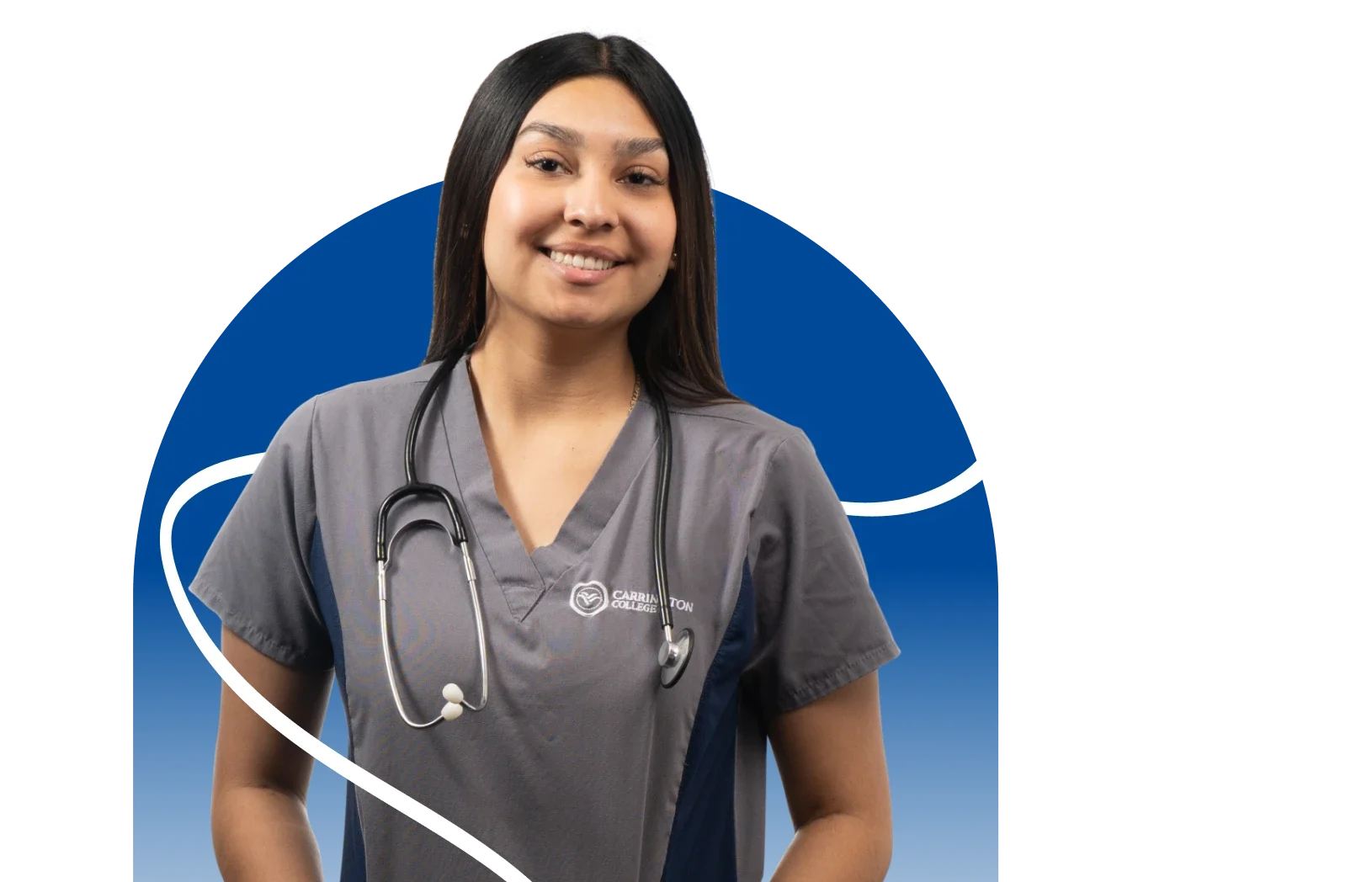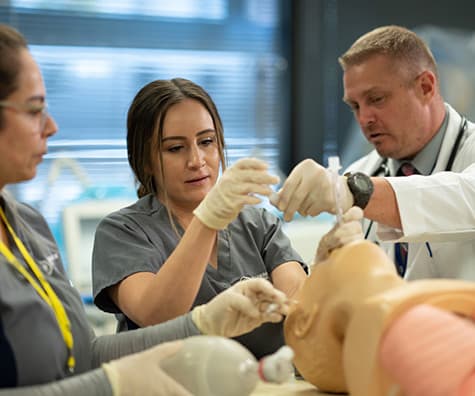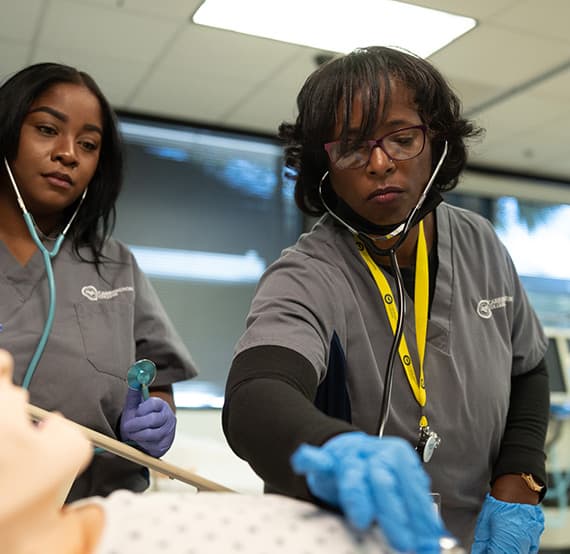Respiratory Care Program
Carrington’s Respiratory Care program prepares graduates to work in a variety of medical settings helping patients work on breathing and other respiratory problems.


Program Details
Program Goal
The goal of Carrington College’s Respiratory Care Program is to prepare graduates with demonstrated competence in the cognitive (knowledge), psychomotor (skills), and affective (behavior) learning domains of respiratory care practice as performed by registered respiratory therapists (RRTs).
Cost & Financial Aid
Education is a major investment, but it’s an investment in your future. Every student comes to Carrington with unique financial needs. Carrington College is committed to helping you achieve your education goals. We participate in most financial assistance programs, both federal and state, as well as private financing. Each program has different requirements and application instructions. Student loans, grants, and scholarships are available to those who qualify.
For complete information on current tuition costs, please see page 236 of the Academic Catalog.
Location Availability
Carrington College’s Respiratory Care program is available at three campuses in three states. To learn more about each location, explore their campus pages.
Accreditation and Approvals
Carrington College is accredited by the Accrediting Commission for Community and Junior Colleges, Western Association of Schools and Colleges (ACCJC/WASC), 428 J Street, Suite 400, Sacramento, CA 95814; 415- 506-0234, an institutional accrediting body recognized by the Council for Higher Education Accreditation and the U.S. Department of Education.
Additional information about accreditation, including the filing of complaints against member institutions, can be found at www.accjc.org/.
The Respiratory Care Associate of Science degree programs at the Las Vegas (#200536), Phoenix (#200390), and Pleasant Hill campuses (#200542) are accredited by the Commission on Accreditation for Respiratory Care (CoARC): http://www.coarc.com. TELEPHONE: 817-283-2835
“CoARC accredits respiratory therapy education programs in the United States. To achieve this end, it utilizes an ‘outcomes-based’ process. Programmatic outcomes are performance indicators that reflect the extent to which the educational goals of the program are achieved and by which program effectiveness is documented.”
CoARC’s outcomes webpage coarc.com/students/programmatic-outcomes-data/
For comprehensive information on Carrington’s accreditation and approvals, visit carrington.edu/accreditation.

Request Information
Career Opportunities
Respiratory therapists care for those who have trouble breathing. Some of the most common chronic respiratory illnesses are chronic obstructive pulmonary disease (COPD), asthma, occupational lung diseases, and pulmonary hypertension. According to the World Health Organization’s most recent data, more than 262 million people had asthma globally1 and there were 3.23 million deaths from Chronic obstructive pulmonary disease (COPD) globally in 2019.2
Respiratory therapists work with common respiratory patients like those described above, as well as everyone from premature infants with undeveloped lungs to elderly patients who have diseased lungs. Respiratory therapists also provide emergency care to patients suffering from heart attacks, drowning, or shock, according to the BLS.3
Some common job duties of a respiratory therapist include:
- Interviewing and examining patients with breathing or cardiopulmonary disorders
- Consulting with physicians to develop patient treatment plans
- Performing diagnostic tests, such as measuring lung capacity
- Treating patients by using a variety of methods, including chest physiotherapy and aerosol medications
- Monitoring and recording patients’ progress
- Teaching patients how to take medications and use equipment, such as ventilators

What Will I Learn?
CARDIAC AND RESPIRATORY ANATOMY AND PHYSIOLOGY
INTUBATION AND AIRWAY CLEARANCE
CHEST TUBES AND TRACHEOSTOMY CARE
PATIENT EXAMINATION, ASSESSMENT, AND TREATMENT PLANNING
Check out our guide on becoming a Respiratory Therapist.
It can be argued that nothing is more important than the ability to breathe. This is why so many are drawn to a career as a Respiratory Therapist. Respiratory Therapists help patients breathe better, taking care of patients suffering from chronic or acute illnesses like asthma or pneumonia. Learn how to become a Respiratory Therapist, what to look for in Respiratory Therapy training, and more about this exciting healthcare career.

Respiratory Therapist FAQ
How long does it take to become a Respiratory Therapist?
While the exact length of time it takes to complete any program often can depend on personal factors and preferences, Respiratory Therapy is a medical career that requires less schooling. Carrington’s Respiratory Care program can be completed in as few as 19 months.
What does a Respiratory Therapist do?
Respiratory Therapists work with patients who are struggling with breathing, including those with chronic respiratory disease, such as asthma or emphysema. They may work with all age groups, with whom they will measure breathing capacity and work to administer treatment.3
How much schooling do you need to be a Respiratory Therapist?
Respiratory Therapists typically have an Associate Degree, though some go on to complete a Bachelor’s in Respiratory Therapy.4
What classes do you take to become a Respiratory Therapist?
Some classes required at Carrington College include:
- Anatomy and Physiology
- Principles of Mathematics
- Introduction to Respiratory Care
- Pharmacology
- English Writing and Composition
- Introduction to Psychology
- Clinical Laboratory Practice
- Fundamentals of Respiratory Care
- Respiratory Care Pathophysiology
- Introduction to Sociology
- Ventilatory Principles of Respiratory Care
- Clinical Practice I
- Clinical Practice II
- Critical Care Principles of Respiratory Care
- Neonatal and Pediatric Respiratory Care
- Specialized Respiratory Care
- NBRC Review
- Advanced Respiratory Care
- Clinical Practice III
What is the career path for a Respiratory Therapist?
Everyone’s career will look different. Respiratory Therapists can begin work after completing an Associate Degree and obtaining state licensure (except in Alaska, where national certification is recommended but not required.)4
What certification exams will I be eligible to take upon graduating?
Students who successfully complete the Respiratory Care program at Carrington are eligible for the National Board for Respiratory Care (NBRC) credentialing exams, such as the Therapist Multiple Choice (TMC) exam and the Clinical Simulation Examination (CSE).
NOTE: Carrington College prepares students to take appropriate certification and licensure exams related to their individual majors. The College does not guarantee students will successfully pass these exams or be certified or licensed as a result of completing the program.
How long does it take to become a Respiratory Therapist?
While the exact length of time it takes to complete any program often can depend on personal factors and preferences, Respiratory Therapy is a medical career that requires less schooling. Carrington’s Respiratory Care program can be completed in as few as 19 months.
What does a Respiratory Therapist do?
Respiratory Therapists work with patients who are struggling with breathing, including those with chronic respiratory disease, such as asthma or emphysema. They may work with all age groups, with whom they will measure breathing capacity and work to administer treatment.3
How much schooling do you need to be a Respiratory Therapist?
Respiratory Therapists typically have an Associate Degree, though some go on to complete a Bachelor’s in Respiratory Therapy.4
What classes do you take to become a Respiratory Therapist?
Some classes required at Carrington College include:
- Anatomy and Physiology
- Principles of Mathematics
- Introduction to Respiratory Care
- Pharmacology
- English Writing and Composition
- Introduction to Psychology
- Clinical Laboratory Practice
- Fundamentals of Respiratory Care
- Respiratory Care Pathophysiology
- Introduction to Sociology
- Ventilatory Principles of Respiratory Care
- Clinical Practice I
- Clinical Practice II
- Critical Care Principles of Respiratory Care
- Neonatal and Pediatric Respiratory Care
- Specialized Respiratory Care
- NBRC Review
- Advanced Respiratory Care
- Clinical Practice III
What is the career path for a Respiratory Therapist?
Everyone’s career will look different. Respiratory Therapists can begin work after completing an Associate Degree and obtaining state licensure (except in Alaska, where national certification is recommended but not required.)4
What certification exams will I be eligible to take upon graduating?
Students who successfully complete the Respiratory Care program at Carrington are eligible for the National Board for Respiratory Care (NBRC) credentialing exams, such as the Therapist Multiple Choice (TMC) exam and the Clinical Simulation Examination (CSE).
NOTE: Carrington College prepares students to take appropriate certification and licensure exams related to their individual majors. The College does not guarantee students will successfully pass these exams or be certified or licensed as a result of completing the program.